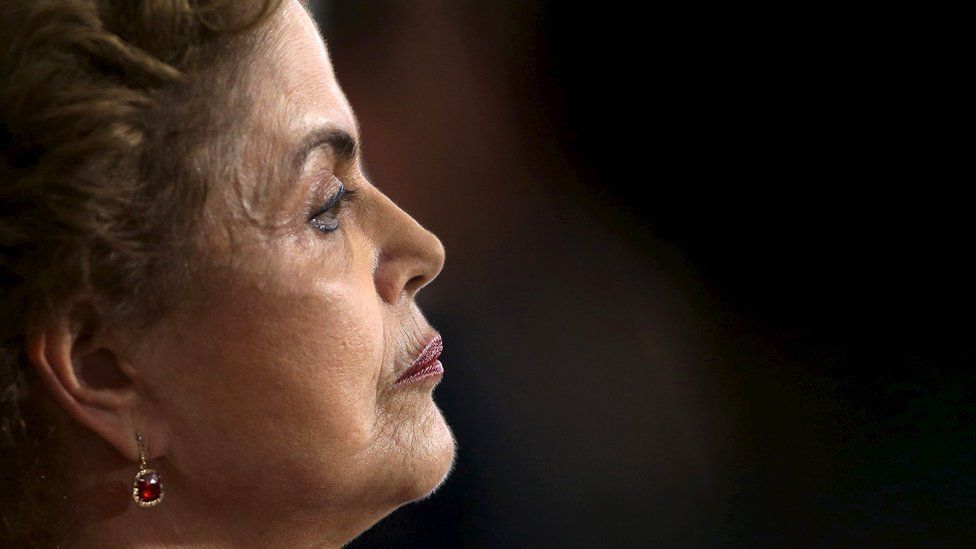Dilma Rousseff and Brazil face up to decisive month
- Published

The announcement that Brazil's largest party, and coalition partner, is leaving government is a major blow to President Dilma Rousseff.
The seven ministers and about 600 political appointees from the Brazilian Democratic Movement Party (PMDB) will need to resign from their jobs in government in the coming days.
The move comes at a crucial time for Ms Rousseff, as she battles for her government's survival in an impeachment process.
Next month, Brazil's Congress will start voting on whether to remove her from office.
The PMDB exit increases the likelihood of her being removed from power as early as May, which would end the time in power of the leftist Workers' Party after more than 13 years.
Opposition and government politicians are campaigning hard to muster up numbers in Congress for a vote, likely to be held around 17 April in the lower house of Congress.
Ms Rousseff's side needs 172 out of 513 votes to bury the impeachment process.
She is accused of using illegal accounting manoeuvres to turn a budget deficit into a surplus last year, but denies wrongdoing.
The opposition needs to secure 342 votes to carry the proceedings on to the upper house, where a simple majority would be enough to suspend Ms Rousseff from office.
If that happens, Vice-President Michel Temer of the PMDB party would become interim president.
As for Ms Rousseff, she would have six months to work on her defence before a final trial later in the year.
The PMDB will play a crucial part in how the drama will now unfold.
The speakers of both houses of Congress and the vice-president are all from the party, and it has more senators and MPs than any other group.
Defining what the PMDB is and what it stands for is a difficult task, even for seasoned political scientists.
Brazilian politics are ideologically defined by two groups that have governed the country since 1994: Ms Rousseff's centre-left Workers' Party (PT) and the centre-right opposition Brazilian Social Democracy Party (PSDB).
Meanwhile, the centrist PMDB has been part of every governing coalition since 1984 - left, centre and right.
A crucial ally
Brazil has dozens of political parties and it is virtually impossible for any president to govern without a broad coalition that can secure support in Congress.
Having the PMDB on board has been crucial for presidents to get things done. But it comes at a high cost.
Last October, as Ms Rousseff needed more support in Congress for her economic reforms, she gave seven ministerial posts to the PMDB, at the expense of her own Workers' Party.
But the PMDB is not a uniform, disciplined outfit, and that explains a lot of Brazil's current political crisis.
The PMDB is a catch-all organisation with a broad spectrum of political leaders and no clear manifesto. Since last year, its ranks have been split over whether to support or oppose Ms Rousseff's government.
The powerful speaker of the lower house of Congress, Eduardo Cunha, openly opposed the coalition from the start. In fact, he was the one who kicked off the impeachment process last December.
On the other hand, some of its most senior members, Mr Temer and the speaker of the Senate, Renan Calheiros, quietly stood by Ms Rousseff.
Recent events have dramatically changed the political landscape and undermined support for the Workers' Party.
Operation Car Wash, the major police investigation into corruption at state oil giant Petrobras, centred its efforts on former President Luiz Inacio Lula da Silva, the Workers' Party's most important political figure and a potential candidate in the 2018 presidential election.
Lula was briefly detained for questioning in early March. A few days later, anti-government crowds held one of the largest street demonstrations in history across the country.
In a risky political move, Ms Rousseff gave Lula a job in cabinet, angering many, who saw it as an attempt to thwart the course of investigations into his affairs.
A judge then released tapes of private phone conversations between Ms Rousseff and Lula, and a court decided to suspend his nomination as minister.
Background moves
Those events took a strong toll on Ms Rousseff's popularity and political support.
The impeachment process centres on the question of whether she used illegal accounting manoeuvres or not.
But in practical terms, MPs and senators are looking mostly at whether she has the strength and legitimacy to govern Brazil, as the country faces a severe economic crisis as well as a political one.
The PMDB was the first major coalition partner to jump ship. It is also the group that stands to gain most should Ms Rousseff be impeached. Mr Temer has reportedly been talking to opposition leaders and working on forming a cabinet.
But despite her weakened stance, Ms Rousseff and her Workers' Party still have support from many in Congress and in the streets.
There will be a lot to play for in the coming days. April 2016 will be a defining month in Brazil's history.
- Published17 March 2016
- Published8 April 2018
- Published21 March 2016
- Published4 March 2016